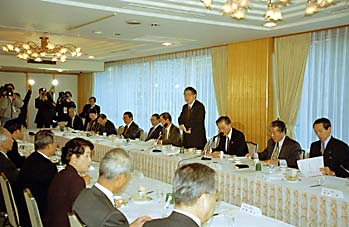The spring struggle
of the year 2000 has started
|
|
Photo: Mr. Washio made greetings
in the opening.
At the beginning of the meeting Mr. Washio, President of RENGO touched upon the Nikkeiren's labour-issue study report, which was published on 12 January this year. While he agreed to the Report that solving employment insecurity and recovering economy were the highest priority, he criticized that recovery of economy would be postponed and employment situation would become in crisis if wage increase were restrained as Nikkeiren insisted. He also pointed increasing employment instability and cuts in welfare services. "The sense of insecurity among people is getting bigger and bigger. Employers should make their best effort at least in raising wages and extending employment contracts." In return to these RENGO' comments, Mr. Okuda, President of Nikkeiren, put emphasis on employment. "A prospect of the economy is still severe, although the situation is getting better. The first priority should be given to improving employment situation for new graduates. We are ready to have consultations with Rengo on the extension of employment contracts." RENGO's General Secretary Mr. Sasamori and Nikkeiren's Managing Director Mr. Fukuoka introduced the Rengo White Paper and the Nikkeiren's Report respectively. Mr. Sasamori pointed out that the spring struggle was a very effective social income distribution system and should be respected and also requested for the cooperation in enhancing the information disclosure. He touched upon working sharing. "Reducing overtime is a presupposition. Three million jobs could be created by reducing overtime work and taking full paid leaves." Furthermore, RENGO emphasized that it is necessary to get rid of the sense of insecurity for the future by controlling careless restructuring, to stimulate domestic demand by adequate wage increases and to fill up a gap between retirement age and pensionable age by extending employment contract. On the other hand, Mr. Fukuoka objected, "We in the first place should return to the rule of right, that is, we should restrain labour costs and increase capital investment. To this end, we both should not ignore that we both should be patient. Work sharing should be discussed taking into consideration the productivity improvement as an absolute necessity. " |
 On 21 January RENGO had a regular consultation
with Japan Federation of Employers' Association (Nikkeiren) in Tokyo
prior to making a demand for the spring struggle of the year 2000. The
two organizations agreed that it was necessary to ease the employment
insecurity and to make a full economic recovery. However, there was
a conflict in opinion. While RENGO insisted that wage increase would
stimulate the consumer mind, Nikkeiren emphasized that the priority
should be given to improving capital investment of enterprises by restraining
the total labour costs.
On 21 January RENGO had a regular consultation
with Japan Federation of Employers' Association (Nikkeiren) in Tokyo
prior to making a demand for the spring struggle of the year 2000. The
two organizations agreed that it was necessary to ease the employment
insecurity and to make a full economic recovery. However, there was
a conflict in opinion. While RENGO insisted that wage increase would
stimulate the consumer mind, Nikkeiren emphasized that the priority
should be given to improving capital investment of enterprises by restraining
the total labour costs.